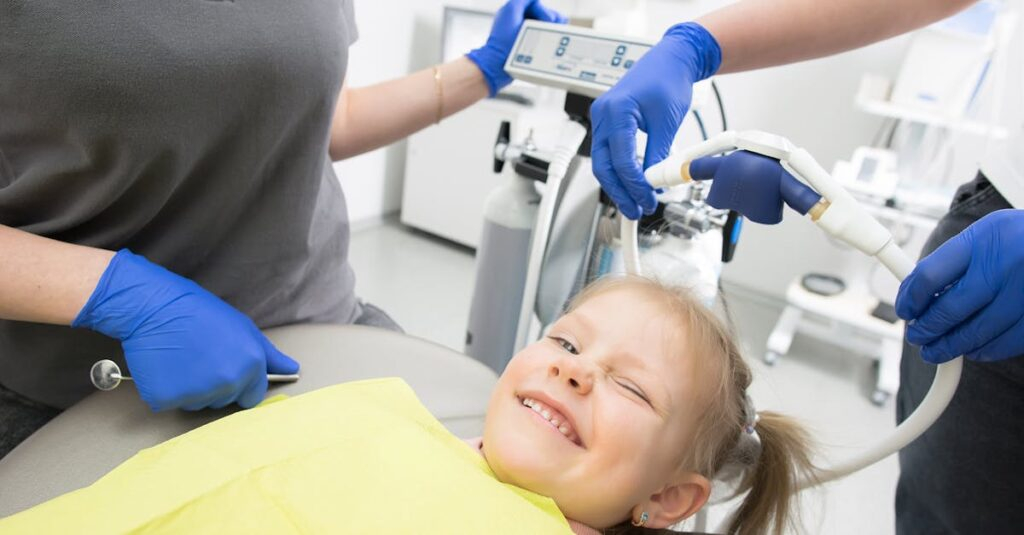Dental health is a crucial aspect of overall well-being, particularly in childhood when habits are formed that can last a lifetime. Establishing good dental hygiene practices early on can help prevent cavities, gum disease, and other oral health issues as children grow. In this blog post, we will discuss the importance of dental health for children and provide practical tips for parents to instill good habits from a young age.
1. The Importance of Early Dental Care
Children’s dental health sets the foundation for their lifelong oral hygiene. Healthy primary (baby) teeth are essential for proper chewing, speaking, and maintaining space for adult teeth. Poor dental health in childhood can lead to painful cavities, infections, and even misalignment of adult teeth. Regular dental check-ups and good hygiene practices are crucial for ensuring a healthy smile.
2. Start Early with Oral Hygiene
It’s never too early to begin caring for your child’s teeth. Parents should start cleaning their baby’s gums with a soft, damp cloth after feeding. Once the first tooth erupts, usually around six months of age, switch to a soft-bristled toothbrush with a tiny amount of fluoride toothpaste (about the size of a grain of rice). Establishing this routine early helps children get used to the practice of brushing their teeth.

3. Teach Proper Brushing Techniques
As children grow, it’s essential to teach them proper brushing techniques. Children should brush their teeth at least twice a day, ideally in the morning and before bedtime. Here are some tips for impressive brushing:
– Use a pea-sized amount of fluoride toothpaste.
– Brush in circular motions, ensuring all surfaces of each tooth are cleaned.
– Brush for at two minutes to insure thorough cleaning.
– Don’t forget to brush the tongue, as bacteria can accumulate there too.
4. Make Flossing a Routine
Flossing is just as important as brushing, but many children (and adults) neglect it. Once two teeth touch, it’s time to start flossing. Teach your child how to floss gently between their teeth to remove food particles and plaque. Encourage them to floss at least once a day, preferably before bedtime.
5. Regular Dental Check-Ups
Scheduling regular dental visits is vital for monitoring your child’s oral health. The American Academy of Pediatric Dentistry recommends that children see a dentist by their first birthday or within six months of their first tooth activity.
Routine check-ups allow the dentist to identify potential issues early and provide professional cleanings that help maintain healthy teeth.
6. Healthy Eating Habits
Diet plays a significant role in dental health. Encourage a balanced diet rich in fruits, vegetables, whole grains, and lean proteins while limiting sugary snacks and beverages. Foods high in sugar can contribute to cavities and tooth decay. Instead of sugary snacks, offer healthy alternatives such as:
– Fresh fruits (e.g., apples, berries)
– Vegetables with hummus
– Cheese or yogurt
7. Limit Sugary Beverages
Sugar-laden beverages, including soda and fruit juices, can harm dental health. Encourage children to drink water instead. If they do consume sugary drinks, remind them to brush their teeth afterward or rinse their mouth with water to minimize the impact of sugar on their teeth.
8. Lead by Example
Children often mimic the behaviors of their parents. Make dental hygiene a family affair by practicing good oral health habits together. Brush and floss your teeth alongside your child to demonstrate the importance of maintaining a healthy smile.
9. Educate About the Importance of Dental Health
Help your child understand why dental health is important. Explain how healthy teeth contribute to their ability to eat, speak, and smile confidently. Use fun resources, such as videos or books about dental health, to engage them and make learning enjoyable.
10. Address Dental Fears
Many children experience fear related to dental visits. To ease these fears, talk openly about what to expect during a dental appointment. Consider scheduling a “happy visit” where your child can meet the dentist and staff without undergoing any procedures. This can help make future visits more comfortable.
Conclusion
Establishing good dental habits early is essential for your child’s long-term oral health. By teaching proper brushing and flossing techniques, encouraging healthy eating, and scheduling regular dental check-ups, parents can set their children up for a lifetime of healthy smiles. At Happy Life, we believe that investing in your child’s dental health today will reap benefits for years to come.
“A healthy smile is a happy smile!”
- Diwali 2025 kab hai : कब मनाई जाएगी दीवाली? एक क्लिक में नोट करें सही डेट और पूजा समय
- Govardhan Puja 2025 :गोवर्धन पूजा का तारीख, महत्व, कथा और पूजा विधि
- Bhai Dooj 2025:तिथि, महत्व और पूजा विधि |
- Skin Whitening: Best Soap, Cream, Multani Mitti, Vitamin E & 9Natural Treatment Guide
- Multani Mitti for Skin Whitening: मुल्तानी मिट्टी से चेहरे को गोरा बनाने के आसान 7 घरेलू नुस्खे









